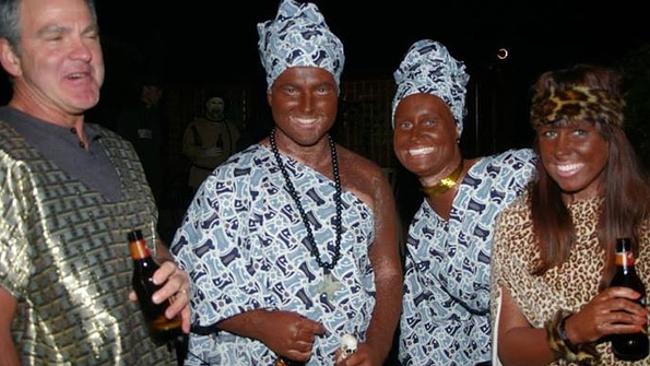In recent weeks, internet traffic has been abuzz with discussions and accusations of “cultural appropriation.” Figures like Miley Cyrus, whose recent videos and television appearances often include “twerking”, have led many to question the ways in which various groups in our society share and adopt one another’s cultures. More often than not, these criticisms have suggested that it is wildly inappropriate for one race, ethnicity, religion or socio-economic group to adopt the cultural expressions of another, especially as a means of entertainment or aesthetic expression (fashion.)
Such criticism is not only well intentioned, but in some cases, well deserved. Cultural appropriation, especially in the past, has often been used as a form of mockery and degradation. The “black-face” minstrel shows of the 19th and 20th century American South for instance, were used to mock, rather than celebrate African American culture. More recently, a controversy erupted at the University of Montreal, where event organizers donned “black face” and marijuana related chants in an attempt to represent Jamaican culture.
The problem then is not cultural appropriation but the confusion between cultural appropriation which is intended as a celebration and cultural appropriation which is intended as a form of mockery. For sake of argument, we could call this “cultural mockery.” While some ambiguity will always remain, the distinction is usually quite obvious. There should be no confusion between minstrel shows and the music of recently murdered Greek musician Pavlos Fyssas, who used (culturally appropriated) hip-hop to promote racial equality.

Certain Australians have been portrayed as racist after photos leaked of a 21 year old’s African-themed birthday party
While it is ostensibly clear that one ought to condemn cultural mockery, we need to remain cautious when criticizing larger patterns of cultural appropriation more generally. Regardless of the quality of his music, Marshall Mathers (Eminem) has every right to appropriate African American culture because he does so in a manner which is celebratory rather than discriminatory. Nothing in his music suggests disdain for African Americans; to the contrary, his music should be understood as an expression of his identification with the largely African American society he grew up in.
It should be immediately obvious that the demand for culture to be expressed only by people who stereotypically represent that culture is both absurd and dangerous. But why? The answer is quite simple; because culture is not a linear development. No cultural item or behaviour, whether hip-hop, the hijab, Rastafari, Polish folk dancing, blue jeans or Japanese poetry can be ascribed to one single racial, ethnic, religious or national group. Rather, all cultural artifacts are the product of an innumerable number of interactions of trade, war, immigration, translation, colonization and exploration.
Those familiar with basics of musical history will understand that culture is forged from interaction, not isolation. 20th century heavy metal, first pioneered by bands like Black Sabbath and Led Zeppelin (composed entirely of white males) has its origins in the African American blues of the American South (as suggested by the band members themselves.) When Keith Richards and Mick Jagger decided to appropriate African American culture into their music, they did so from a place of admiration. If then, as today, white males were discouraged from appropriating the music of another cultural group, The Rolling Stones would have never come to be.
The most caustic criticisms of cultural appropriation often centre on the appropriation of religious icons, music and dress. This is deeply ironic considering that the spread and practice of all major world religions, from Zoroastrianism to Christianity, is the product of cultural appropriation. The modern Christmas tree and easter eggs, which have no place in the Bible or early Christian history, are layovers from Europe’s pagan past. The Judeo-Christian tale of Genesis found in the Torah was probably appropriated from the ancient Babylonian “Epic of Gilgamesh” when the people of Judea were forced into Mesopotamian captivity around 586 BC.

Averroes was the preeminent philosopher in the history of Al-Andalus.
Similar observations can be made about the development of intellectual culture. When North African Muslims colonized Southern Europe in the 8th century, they brought with them a wealth of medicinal, linguistic and theological knowledge. So advanced was their thinking that cities like Granada became the world’s most sophisticated centres of science and trade while Paris and London remained provincial obscurities for several centuries. The works of the pagan thinkers Aristotle and Plato, which would later become a central pillar of European Christianity, were only made available because of their preservation and translation by Muslim scholars like Averroes. In fact, Averroes’ contribution to the development of Western intellectualism was so great that he was featured in Raphael’s famous painting “The School of Athens.”
All of these examples enshrine the same fundamental fact; that the cultures which we deem the property of one group or another were in fact developed in a context of interaction and shared experience. To suggest that rock ‘n roll, easter eggs or platonic philosophy are the property of one ethnic or religious group is not only misleading, it is historically wrong, plain and simple. The problems with criticizing cultural appropriation however, do not end with simple historical inaccuracy.

Richard Wagner was commonly regarded as an anti-semite.
The entire notion that cultural appropriation is an invasive form of theft is detrimental because it forces people of a certain religious, ethnic or racial group to abide only by their most contemporary and salient forms of cultural expression. In this way, the refusal to share culture amounts to little more than a form of crude nationalism or tribalism. Richard Wagner, a composer often associated with the artistic articulation of growing German nationalism in the 19th century, was deeply opposed to the cultural appropriation of European music by Jews because he believed that they could never understand it within its original context. The modern reader will immediately see the absurdity in suggesting that a Jew could never appreciate or understand “The Ride of the Valkyries.” Yet, there are obvious parallels between the exclusivity of Wagner’s beliefs and those currently being expressed on the exclusivity of hip-hop culture. One group has declared a form of cultural expression as its own while expelling all others seeking to take part.
In an increasingly globalized world in which traditional definitions of race, sex, gender, religion and age are constantly being expanded and redefined, we cannot continue to guard our means of cultural expression as “our” property. To do so is to paint ourselves as cultural progenitors and everyone else the proverbial “other.” We live in a time when Russians wear Levis, Iraqis listen to heavy metal and the most popular dish in Great Britain is chicken Tikka masala; none of these appropriations embody a spirit of mockery. While we all remain ever vigilant of bigots wishing to degrade cultures in the style of minstrel shows, we ought to relax our fury at legitimate expressions of culture which are not traditionally found in this group or that. As the expression goes, “imitation is the sincerest form of flattery.”
WRITTEN BY GALEN OESTERMANN



